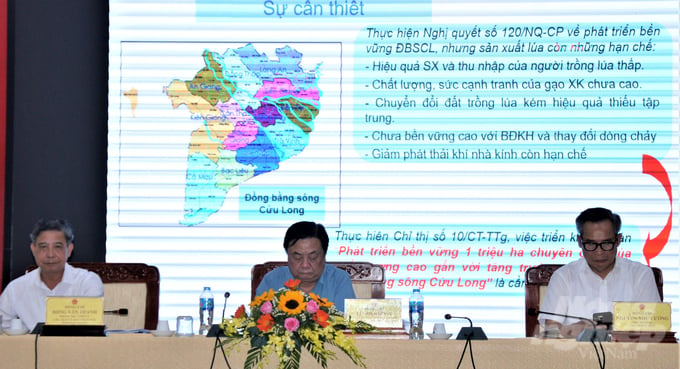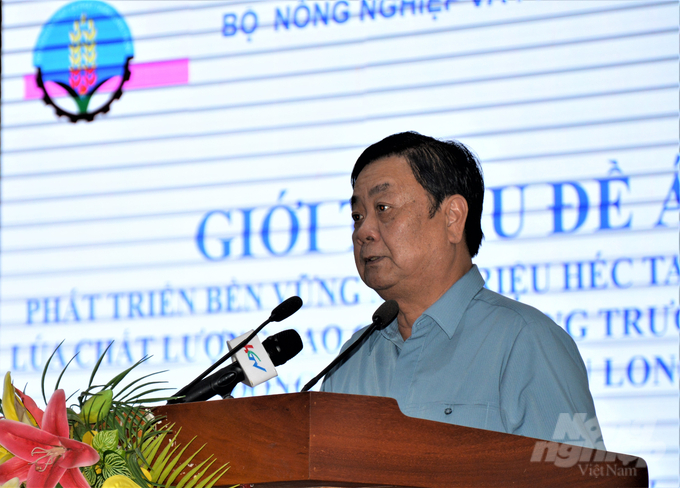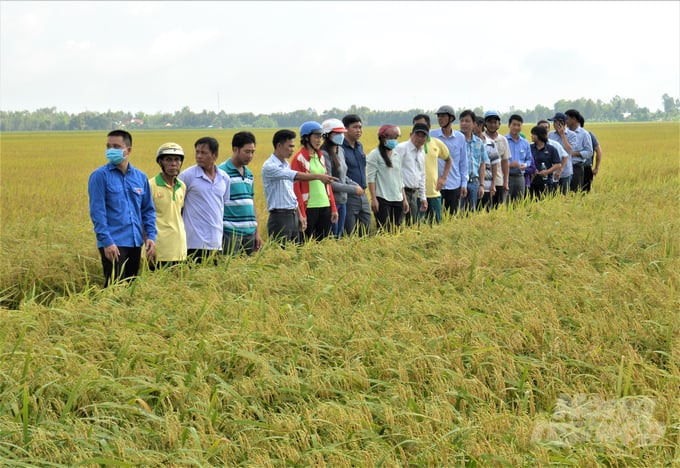May 26, 2025 | 09:15 GMT +7
May 26, 2025 | 09:15 GMT +7
Hotline: 0913.378.918
May 26, 2025 | 09:15 GMT +7
Hotline: 0913.378.918
The Ministry of Agriculture and Rural Development coordinated with Hau Giang Provincial People's Committee to organize a workshop on "Sustainable development project of 1 million hectares of high-quality specialized rice associated with green growth" on April 7, in Vi Thanh City. Various leaders of provinces and cities in the Mekong Delta, corporations and businesses in the rice industry, experts and international financial institutions have come to participate, with Minister of Agriculture and Rural Development Le Minh Hoan chairing and delivering the opening speech at the workshop.

Delegates at the workshop on "Sustainable development project of 1 million hectares of high-quality specialized rice in association with green growth". Photo: Trung Chanh.
According to Minister Le Minh Hoan, the project to develop 1 million hectares of high-quality rice is a new, extensive and comprehensive issue, so stakeholders must consult thoroughly before implementation. "The project is not just about converting from low-quality to high-quality rice, it's also about changing mindsets and production methods. Every change is a challenge, but if we fail to change, the future will be even more difficult. We often think about what we have to invest in order to bring about the changes, but we don't usually consider the potential losses if we don't change," said the leader of the agriculture sector.

Minister of Agriculture and Rural Development Le Minh Hoan chaired and delivered a keynote speech at the workshop. Photo: Trung Chanh.
According to Mr. Cao Thang Binh, Senior Specialist at the World Bank in Vietnam, rice production in the Mekong Delta is limited by 3 major obstacles, including low productivity, low quality and low income. The agricultural sector has provided technical support, researched and created new varieties to help farmers overcome 2 of these issues. Vietnam's rice production has reached very high levels. Moreover, rice quality has significantly increased, and the export price has surpassed that of Thailand.
However, better income for rice farmers still poses a challenge for the stakeholders. If a farmer focusedly cultivates rice in an area of fewer than 2 hectares, they will not be able to provide for their family. The Mekong Delta has millions of farming households with less than 2 hectares of production area. If they cannot change the production method, their future will be arduous.
Agricultural expert Bui Ba Bong set four key tasks for the agricultural sector to solve in unity: Firstly, implement the production linkage chain. Secondly, announce the production process and quality standards. Thirdly, emphasize the protection of the environment, reducing greenhouse gas emissions. Fourthly, increase income for rice growers.
According to Mr. Bong, it is necessary to educate farmers and change the production scale of rice households in order to achieve these goals. The rate of mechanization and technology application in agricultural production must be accelerated.
Mr. Cao Thang Binh suggested: “This project should be included in the climate change adaptation program under the Government of Vietnam, in order to prioritize ODA loans for implementation. The WB is also committed to accompanying and supporting resources for the project."
Mr. Dong Van Thanh, Chairman of Hau Giang Provincial People's Committee, Hau Giang is a province specializing in agriculture, with climate conditions suitable for the development of rice and fruit crops. By participating in the project to develop sustainable agricultural production, Hau Giang has opened a field dedicated to rice cultivation, where farmers apply the technique of 3 reduction - 3 increase, 1 must - 5 decrease, and high quality rice accounts for most of the crop. Additionally, the province has established farmer organizations to link production, build organic and safe production models in an effort to increase the value of rice. Hau Giang strongly supports the implementation of the project for 1 million hectares of high-quality rice and commits to participate in the project with 28,000 hectares by 2025 and expanding to 46,000 hectares by 2030.
Mr. Le Thanh Tung, Deputy Director of the Department of Crop Production believes that the sustainable development project of 1 million hectares of high-quality specialized rice in association with green growth will have significant economic, environmental and social impacts. The overall goal of the project is to form a high-quality rice-growing area with a production system organized according to the value chain. Sustainability standards will be utilized in order to adapt to climate change, reduce greenhouse gas emissions. As a result, production and business efficiency will be improved in addition to increased income for rice farmers. Moreover, the project will help establish a brand, improving the quality and reputation of Vietnamese rice products on the global market.

Millions of farmers in the Mekong Delta will benefit from the sustainable development project of 1 million hectares of high-quality specialized rice in association with green growth. Photo: Trung Chanh.
Mr. Huynh Van Thon, Chairman of Loc Troi Group, said that millions of farmer households will benefit from the project. Loc Troi Group will participate in the Project as an active and direct implementer. However, the project also requires the participation of multiple cooperatives, because the chain of businesses can only link with farmer organizations, not individuals.
The Project will be implemented in 12 provinces and cities in the Mekong Delta (except for Ben Tre). The project will be deployed on approximately 200,000 hectares of land by 2024, where the VnSAT project was previously implemented. This area is expected to reach 500 thousand hectares with an output of about 6.5 million tons by 2025 and subsequently, 1 million hectares with an output of 13 million tons by 2030.
Translated by Nguyen Hai Long
/2025/05/25/4127-3-073637_820.jpg)
(VAN) Thanks to the promotion from an FAO-implemented project, vegetable production in greenhouses in Moc Chau has seen strong development, from 1.5 hectares in 2021 to nearly 50 hectares in 2024.

(VAN) FAO has recently supported USD 140,000 to implement the project 'Risk mitigation human-animal interface risks through disease control initiatives in pig farming.'

(VAN) The People's Committee of Tra Vinh province has approved an adjustment to the investment policy for the Green Hydrogen Plant project, increasing its area to approximately 52.76 hectares.
![Reducing emissions from rice fields: [2] Farmers’ commitment to the soil](https://t.ex-cdn.com/nongnghiepmoitruong.vn/608w/files/news/2025/05/05/dsc08881jpg-nongnghiep-140632.jpg)
(VAN) Clean rice cultivation model in Thuong Tan commune, Bac Tan Uyen district, is assisting local residents in achieving sustainable agriculture by substantially reducing costs, increasing productivity, and protecting the environment.

(VAN) At the conference to disseminate Resolution No. 68, AgriS introduced its digital agricultural ecosystem and reaffirmed its commitment to accompanying the Government in promoting private sector development and sustainable agriculture.

(VAN) 'Blue Ocean - Blue Foods' initiative is designed to restore marine ecosystems and establish sustainable livelihoods for local communities by cultivating a minimum of 1,000 hectares of cottonii seaweed in the first three years.
/2025/05/21/4642-3-112707_603.jpg)
(VAN) The V-SCOPE project has made direct contributions to three out of six pillars of the Comprehensive Strategic Partnership between Vietnam and Australia.